1.5 Decades - A History of OpenConcept
on
This is a story of our origins that I hope will resonate with others seeking change in this world. There are many truths, some of them are here.
Foundation
The name OpenConcept came from a kitchen table conversation between three friends: Nancy Shaver, Russell McOrmond and myself. The initial idea was to use the Web as an interface for Popular Education (PopEd) and to help build Sustainable Communities. This idea never got off the ground at the time, but Russell continued to direct me in the essentials of HTML, PHP, MySQL and server administration. Russell also schooled me in the ethics of open-source software. Open-source software is free for people to use modify and distribute - this is community driven software. At the time I was working at Oxfam Canada and learning from Oxfam Australia volunteers Danny Yee and Cameron Tampion who were using these tools at the opposite end of the globe.
Formation
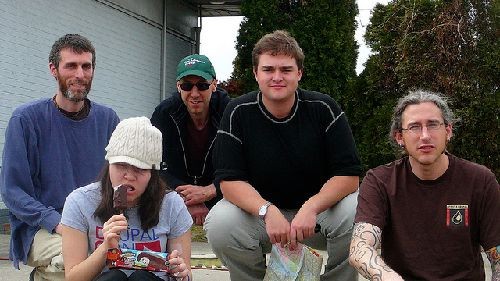 Having watched the Web evolve in its early years, I was convinced that the Internet could play an important role to make the world a better place. I took the leap and became a self-employed web developer in 1999. At the time, a coalition of organizations were organizing an educational caravan to raise awareness about the effects of globalization centered around the World Trade Organization conference. Working with the Common Front Against the WTO in the initial months of my business was so important to me and to OpenConcept. I was in a terrific place to support initiatives like Indymedia that also started to pop up following success in the Battle of Seattle.
Having watched the Web evolve in its early years, I was convinced that the Internet could play an important role to make the world a better place. I took the leap and became a self-employed web developer in 1999. At the time, a coalition of organizations were organizing an educational caravan to raise awareness about the effects of globalization centered around the World Trade Organization conference. Working with the Common Front Against the WTO in the initial months of my business was so important to me and to OpenConcept. I was in a terrific place to support initiatives like Indymedia that also started to pop up following success in the Battle of Seattle.
I was experimenting with early PHP-based Content Management Systems like phpSlash. Experimenting with this tool I was able to get national media attention with a website built to highlight critical stories about the Canadian Alliance. I saw that this new technology could be used to effectively raise awareness and concern. It was pretty clear at this point that I needed to give my clients control over their content – I saw that my clients would inevitably have better sites if they had a framework to at least allow them to edit their text and add images at their convenience.
Content Management
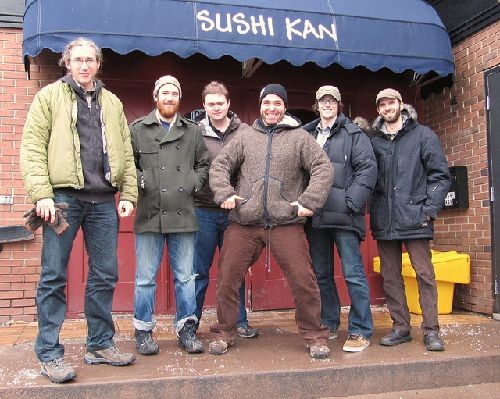 In the fall of 2000, I was approached by Mark Surman to help them launch rabble.ca. This was beyond my technical ability at the time so I reached out to Krishna Bera to work with me on this project. Using the Association of Progressive Computing's ActionApps framework, we pieced together the first publishing engine for this new online news source.
In the fall of 2000, I was approached by Mark Surman to help them launch rabble.ca. This was beyond my technical ability at the time so I reached out to Krishna Bera to work with me on this project. Using the Association of Progressive Computing's ActionApps framework, we pieced together the first publishing engine for this new online news source.
All of this time I was working out of my very small home in Old Ottawa East. In January, 2001 work got a bit more challenging with the birth of my youngest daughter who refused to sleep through the night for the following eighteen months.
That spring, we developed our first e-advocacy tool. Jaggi Singh had been arrested at the 3rd Free Trade Area of the Americas summit in Quebec City. In an effort to protest creatively, Jaggi had been catapulting teddy bears over the fenced off conference area. The petition we developed for rabble.ca gathered the names of thousands of concerned citizens who were upset with the actions of police. It was useful to draw attention to the actions of police at the FTAA and likely also for Jaggi Singh's release.
Sadly, this intense period of collaboration between progressive unions, non-profits, educators and politicians essentially ended with 9-11. A culture of fear took over as the world prepared for a "Global War on Terrorism".
Back-End
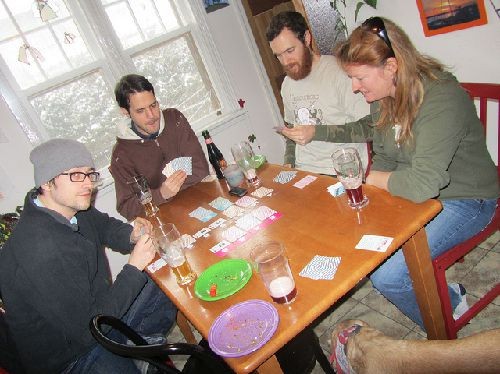 I was looking at a variety of content editing tools and found one I liked. Unfortunately, the initial maintainer was stepping down, so I became the lead maintainer of an open-source CMS called Back-End. I brought on a few more technical developers like Peter Bojanic, Peter Cruickshank and Joe Stewart, and we were able to extend this project to fit the needs of our clients. We pushed this CMS to be bilingual, have a simple gallery as well as an e-Action letter module. We made Back-End work with a bi-directional English/Farsi site and brought Farsi collation into MySQL.
I was looking at a variety of content editing tools and found one I liked. Unfortunately, the initial maintainer was stepping down, so I became the lead maintainer of an open-source CMS called Back-End. I brought on a few more technical developers like Peter Bojanic, Peter Cruickshank and Joe Stewart, and we were able to extend this project to fit the needs of our clients. We pushed this CMS to be bilingual, have a simple gallery as well as an e-Action letter module. We made Back-End work with a bi-directional English/Farsi site and brought Farsi collation into MySQL.
This was an incredible learning experience. We worked with a number of great NDP Members of Parliament (MPs) supporting their staff to have more direct and immediate access to the public. We set up Bill Blaikie with the first content management system of any MP in the House of Commons. The biggest challenge for our early team and this CMS came with our implementation of the CUPE National website. Back-End reliably delivered their site until earlier this year when we replaced it with a new Drupal site.
Working with Back-End was a great opportunity to learn more about managing open source projects. I'd recommend building a CMS to anyone looking for a challenging learning experience. Ultimately though, I came to the realization that there wasn't a sufficient critical mass of users and developers to make it affordable and enjoyable to work with. Although it was a very light, object-oriented, multi-lingual CMS, it wasn't going to be sustainable.
Most of the sites we built at that time were hosted on servers owned and managed by Russell McOrmond.
Drupal
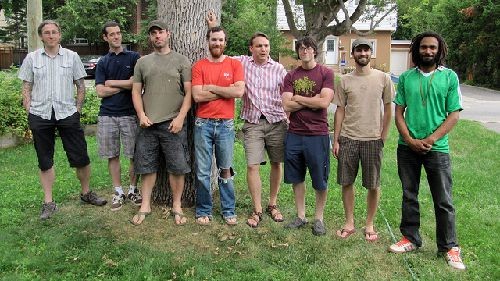 A number of people were influential in the decision to choose Drupal as our next platform. Omar Bickell, Henry Poole, and Dan Robinson all had a big effect on my choices. I was impressed by the APIs and clean code, but mostly struck by the positive community. Built on Drupal, DeanSpace was used to help raise awareness about Howard Dean's campaign for President of the USA. Even after the failure of the Howard Dean campaign, it was clear that this software community was special.
A number of people were influential in the decision to choose Drupal as our next platform. Omar Bickell, Henry Poole, and Dan Robinson all had a big effect on my choices. I was impressed by the APIs and clean code, but mostly struck by the positive community. Built on Drupal, DeanSpace was used to help raise awareness about Howard Dean's campaign for President of the USA. Even after the failure of the Howard Dean campaign, it was clear that this software community was special.
In 2005 I made the decision to wind down my support of Back-End and begin the transition of my business and my clients to Drupal. This wasn't an easy process, especially given that at that time Drupal's multi-lingual support was pretty sad. There were ways to do this with hacking the Core, but it wasn't easy.
At this point Drupal wasn't very well known. Since we joined, the community has grown considerably and the impact of this software has also expanded.
Accessibility
I had close friends in high-school and university with Cerebral Palsy, so accessibility has always been something that I was interested in. After the stock market crash in 2008, I realized that OpenConcept needed to diversify its clients. Seeing legislation like the Accessibility for Ontarians with Disabilities Act (AODA) was being adopted by government I took the initiative to look at Drupal's accessibility and see if it could be improved. Thanks to early encouragement from Angie Byron, I got my first patch into Drupal Core and also became much more aware of all of the other barriers for people with disabilities.
I spearheaded the accessibility improvements in Drupal and OpenConcept hired Everett Zufelt to work with us full-time on improving Drupal 7's accessibility. In 2012, I officially became a Drupal 8 Core Maintainer. I saw that there was an opportunity to fix accessibility problems at the source, by fixing problems in Core, millions of people simply inherit the accessibility improvements we've made.
Obviously, accessibility is critical for governments seeking to represent their citizens. Financially, ignoring accessibility is wasteful for business. It has been exciting to see the uptake of Drupal by government agencies and non-profits. Ultimately though, it is simply short-sighted to assume that the abilities we have today will be with us tomorrow. We can build web infrastructure to improve everyone's access, but it is a complicated an ongoing process. This isn't an issue you can simply check off and then ignore.
I think the most exciting part of open-source web accessibility is that people with disabilities can be involved to actively address barriers.
Inc.
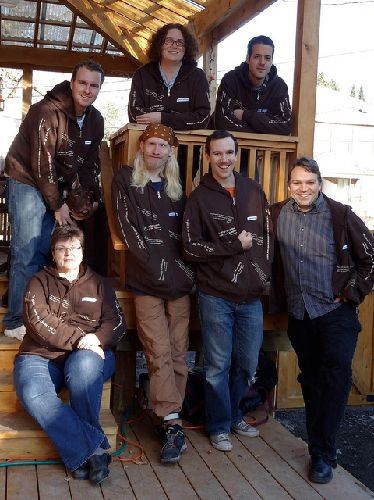 I had decided to make the jump from being a freelancer to being an employer because it was too difficult to keep up by working on my own. I incorporated my business on September 15, 2006, guided by my business coach Peter Parrish, and began to hire other developers and bring on a bookkeeper to ensure that my business grew effectively. We added new clients and began to work for organizations outside of Canada. Steve Mccullough, Eliot Che, and Mitch Donovan played a strong role in seeing that we succeeded through this phase.
I had decided to make the jump from being a freelancer to being an employer because it was too difficult to keep up by working on my own. I incorporated my business on September 15, 2006, guided by my business coach Peter Parrish, and began to hire other developers and bring on a bookkeeper to ensure that my business grew effectively. We added new clients and began to work for organizations outside of Canada. Steve Mccullough, Eliot Che, and Mitch Donovan played a strong role in seeing that we succeeded through this phase.
It was important to me to create a work environment that inspired collaboration and community. I cooked lunch for everyone each day until we grew too busy and big, then we took turns. Over lunch we were able to discuss things above and beyond our existing projects. It became clear that the team really didn't want to work for just anyone, but was interested in selecting clients who we felt were playing a positive role in our society.
Formalizing
Taking on more and larger projects forced us to take on our first dedicated Project Manager and to develop a Project Management System (Pröjektò) - initially built by Ethan Chiddicks in Drupal 6. We professionalized our Human Resources and Communications, and worked on the documentation of server structure. We experimented with taking on interns and explored ways to support more women within the tech community.
As part of this growth and formalization, OpenConcept finally grew too big for our home.
West End Well
After 15 years based in my house, OpenConcept moved to the West End Well in July of 2014. This provides us with an opportunity to have more spontaneous casual collisions with other interesting people. We hope that there are many collaborations that can result in us sharing our space with a community minded co-op in Ottawa.
OpenConcept could not have existed without the inspiration, support, collaboration and commitment of a lot of great people. I continue to be inspired to create websites and on-line tools that build community, promote social justice and most importantly, allow me to be active in creating the future I want to live in.
I am very proud of what we have accomplished as a team! I am filled with confidence in the team that we have assembled and in our ability to become the change we seek in this world.
Share this article
About The Author
Mike Gifford is the founder of OpenConcept Consulting Inc, which he started in 1999. Since then, he has been particularly active in developing and extending open source content management systems to allow people to get closer to their content. Before starting OpenConcept, Mike had worked for a number of national NGOs including Oxfam Canada and Friends of the Earth.



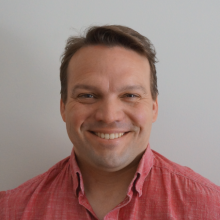
Add new comment